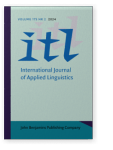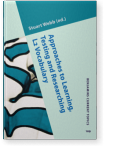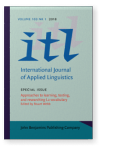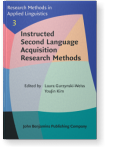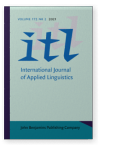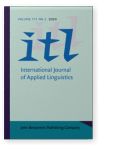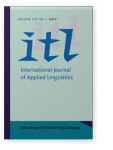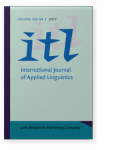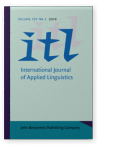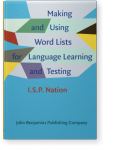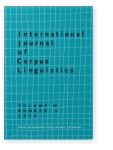Stuart Webb
List of John Benjamins publications for which Stuart Webb plays a role.
Journal
Titles
Approaches to Learning, Testing and Researching L2 Vocabulary
Edited by Stuart Webb
[Benjamins Current Topics, 109] 2020. v, 234 pp.
Subjects Applied linguistics | Language acquisition | Language teaching | Multilingualism
Approaches to learning, testing, and researching L2 vocabulary
Edited by Stuart Webb
Special issue of ITL - International Journal of Applied Linguistics 169:1 (2018) vi, 231 pp.
Subjects Applied linguistics | Language acquisition | Language policy | Language teaching | Multilingualism
2024 The effect of test format on productive recall of derivatives ITL - International Journal of Applied Linguistics 175:2, pp. 242–270 | Article
This study investigated the extent to which two recall test formats – contextualized and decontextualized tests – affected productive recall of derivatives, and how the effects of token frequencies of derivatives and L2 receptive vocabulary knowledge on recalling derivatives was moderated by… read more
2022 Chapter 8. Vocabulary: A guide to researching instructed second language vocabulary acquisition Instructed Second Language Acquisition Research Methods, Gurzynski-Weiss, Laura and YouJin Kim (eds.), pp. 181–206 | Chapter
Acquiring vocabulary knowledge is a vital part of L2 learning because vocabulary plays a significant role in every mode of communication (reading, listening, writing, and speaking). For learners to become independent users of a L2, they must know many thousands of words and learn how to use them… read more
2021 How well do learners know derived words in a second language? The effect of proficiency, word frequency and type of affix ITL - International Journal of Applied Linguistics 172:2, pp. 229–258 | Article
The study investigates derivational knowledge of second language (L2) learners as a function of four variables: learner proficiency, word family frequency, derived word frequency, and affix type as suggested by two affix difficulty hierarchies. Seventy-nine EFL learners at two proficiency levels… read more
2020 Incidental vocabulary learning through viewing television ITL - International Journal of Applied Linguistics 171:2, pp. 191–220 | Article
Previous research investigating L2 incidental vocabulary learning from video has primarily focused on short videos from genres that may be conducive to vocabulary learning. The research provides evidence that L2 incidental vocabulary learning can occur through video. However, it is uncertain… read more
2020 The guessing from context test Approaches to Learning, Testing and Researching L2 Vocabulary, Webb, Stuart (ed.), pp. 117–142 | Chapter
This study aims to develop two equivalent forms of the Guessing from Context Test (GCT) and provide its preliminary validity evidence. The GCT is a diagnostic test of the guessing skill and measures the following three important steps in guessing: identifying the part of speech of an unknown… read more
2020 Guest editorial Approaches to Learning, Testing and Researching L2 Vocabulary, Webb, Stuart (ed.), pp. 1–4 | Introduction
2020 Re-examining the effects of word writing on vocabulary learning Approaches to Learning, Testing and Researching L2 Vocabulary, Webb, Stuart (ed.), pp. 73–94 | Chapter
This study investigated the effects of word writing on vocabulary learning by comparing three conditions in which there was (a) limited time to write words, (b) unlimited time to write words, and (c) a non-writing word-picture pairs comparison. Non-native speakers studying English as a second… read more
2019 Lexical aspects of comprehensibility and nativeness from the perspective of native-speaking English raters ITL - International Journal of Applied Linguistics 170:1, pp. 24–52 | Article
This study analyzed the contribution of lexical factors to native-speaking raters’ assessments of comprehensibility and nativeness in second language (L2) speech. Using transcribed samples to reduce non-lexical sources of bias, 10 naïve L1 English raters evaluated speech samples from 97 L2… read more
2018 The guessing from context test Approaches to learning, testing, and researching L2 vocabulary, Webb, Stuart (ed.), pp. 115–141 | Article
This study aims to develop two equivalent forms of the Guessing from Context Test (GCT) and provide its preliminary validity evidence. The GCT is a diagnostic test of the guessing skill and measures the following three important steps in guessing: identifying the part of speech of an unknown… read more
2018 Guest editorial Approaches to learning, testing, and researching L2 vocabulary, Webb, Stuart (ed.), pp. 1–4 | Introduction
2018 Re-examining the effects of word writing on vocabulary learning Approaches to learning, testing, and researching L2 vocabulary, Webb, Stuart (ed.), pp. 72–94 | Article
This study investigated the effects of word writing on vocabulary learning by comparing three conditions in which there was (a) limited time to write words, (b) unlimited time to write words, and (c) a non-writing word-picture pairs comparison. Non-native speakers studying English as a second… read more
2017 The updated Vocabulary Levels Test: Developing and validating two new forms of the VLT ITL - International Journal of Applied Linguistics 168:1, pp. 33–69 | Article
The Vocabulary Levels Test (Nation, 1983; Schmitt, Schmitt, & Clapham, 2001) indicates the word frequency level that should be used to select words for learning. The present study involves the development and validation of two new forms of the test. The new forms consist of five levels measuring… read more
2016 Evaluating lists of high-frequency words ITL - International Journal of Applied Linguistics 167:2, pp. 132–158 | Article
This study compared the lexical coverage provided by four wordlists [West’s (1953) General Service List (GSL), Nation’s (2006) most frequent 2,000 British National Corpus word families (BNC2000), Nation’s (2012) most frequent 2,000 British National Corpus and Corpus of Contemporary… read more
2016 Chapter 15: Making an essential word list for beginners Making and Using Word Lists for Language Learning and Testing, Nation, I.S.P., pp. 153–167 | Chapter
2010 A corpus driven study of the potential for vocabulary learning through watching movies International Journal of Corpus Linguistics 15:4, pp. 497–519 | Article
In this corpus driven study, the scripts of 143 movies consisting of 1,267,236 running words were analyzed using the RANGE program (Heatley et al. 2002) to determine the number of encounters with low frequency words. Low frequency words were operationalized as items from Nation’s (2004) 4th to 14th… read more
